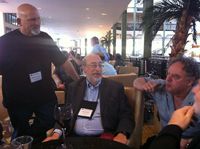(Thanks to our friends at The Rap Sheet)
Month: April 2012
“Rejection by publishers no longer has the same power”
….that's what author Boyd Morrison says and his recent experience certainly proves it.
Back when the Kindle was in its early days, Boyd's The Ark was the first, big, self-pubbed bestseller…and was immediately snapped up in by Simon & Schuster in a major, multi-book deal.
At the time, there were many bitter writers in the so called "indie" community who lambasted him for selling out. The anger was stupid, of course, based more on jealousy than anything else. I argued at the time that Boyd was in a win-win situation…in the best of all possible worlds, he'd become a bestselling author worldwide with big publishers behind him, reaching scores of readers he could never have reached on his own. In the worst case scenario, he'd bomb, but would still benefit from the exposure and reach readers he hadn't before. And he could go back to self-publishing…but a deal like this might never come again.
Well, as it turns out, Boyd split the difference. He writes that he was just dropped by Simon and Schuster, who rejected his new book The Roswell Conspiracy, so he's self-publishing it…but that his publishers overseas loved the book and are bringing it out in print. The upshot is…win-win:
It might seem like I would become a rabid self-publishing advocate because of my situation, but that's hardly the case. My ultimate goal is to get my books to readers in the best possible way. If that's through a traditional publisher, great. I'm thrilled to be with Little, Brown UK because they do a fantastic job publishing my books, from the editing to the book packaging to the marketing and promotion. I have hardworking publishers around the world, with books being released in the next few months in Israel, Germany, Italy, and Thailand. And I'm even still published traditionally in the U.S.: Simon and Schuster will continue to be the publisher of my first four books for the foreseeable future.
But sometimes, as with The Roswell Conspiracy in the U.S., self-publishing is the best (and in this case, only) option. I'll take on all the risk, but I'll also reap the rewards if it goes well. That's the amazing thing about what's happened for authors in the last five years. Rejection by publishers no longer has the same power. What could have been a crushing blow in January was actually just a detour sign, and maybe that new path will turn out to be even better than the route I was planning to take.
This story just proves that this is an exciting time to be an author, that we have options we never had before. and that rejection by every publisher in NY can actually be a money-making opportunity.
Meanwhile,author Mark Terry's experience proves that nowadays a book contract isn't always such a good deal after all. He writes that his agent just sent him his latest, quarterly royalty check on two hardcover novels…
the check she received was in the amount of $249.99. She'll take her 15% of this magnificent sum of money and send me the remaining $212.49, give or take. Then I'll automatically take 24% out for the federal government and 4% out for the state government. That'll give me about $153 give or take, to play around with, pay bills, or sob over.
In comparison, in March I received a royalty check (direct deposit, actually) from Amazon (alone) for $1013. That reflects, I believe, either the month of January's ebook sales or December's.
In other words, he probably lost money by being published instead of self-publishing. Until now, I don't think there's ever been a time when accepting a publishing contract rather than self-publishing could be, for some authors, a very costly mistake.
The way I see it, the ebook, self-publishing revolution sparked by Amazon and the Kindle has been hugely beneficial for authors. Of course there are dark sides, but so far, the pluses far outweight the negatives.
In Pursuit of Spenser
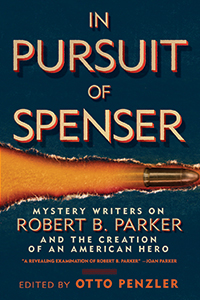 Too many of my good friends contributed to In Pursuit of Spenser, a collection of essays about Robert B. Parker and his writing, for me to be unbiased or, conversely, too critical in my review.
Too many of my good friends contributed to In Pursuit of Spenser, a collection of essays about Robert B. Parker and his writing, for me to be unbiased or, conversely, too critical in my review.
The line-up of authors that editor Otto Penzler assembled for the book includes Loren D. Estleman, Parnell Hall, Brendan DuBois, Gary Phillips, Lawrence Block, Dennis Lehane, Max Allan Collins, SJ Rozan, Jeremiah Healy, Ed Gorman, Reed Farrel Coleman, and Spenser's new author, Ace Atkins.
I'll just say that some of the essays are much stronger than others and don't quite jell as a whole. There's a great, indepth book to be written about Parker and his work and this isn't quite it. For the most part, this book just skims the surface, but I get the sense that's exactly what Penzler was going for. Something as breezy and light as Parker's fiction.
At times, the book reads more like an extended memorial, what friends and admirers might have stood up at the podium to say at Parker's service, had they been given the chance. And it's those essays in particular, the more personal ones from Lehane and Block, that are the most entertaining and revealing. Block obviously admired Parker's craftmanship but also didn't pull any punches. You can read his chapter here.
First Responders
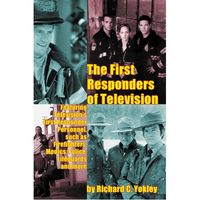 I'm a big sucker for books about TV series, especially encyclopedic works on particular genres (like Wes Britton's The Encyclopedia of TV Spies, etc.) so I would have grabbed Richard Yokley's The First Responders of Television, which covers series about firefighters, medics, and lifeguards, even if Bear Manor Media hadn't been sent me a review copy. And before I tell you what I think of it, you should know that Yokley is a frequent commenter on this blog and that I played a small role in getting his book published.
I'm a big sucker for books about TV series, especially encyclopedic works on particular genres (like Wes Britton's The Encyclopedia of TV Spies, etc.) so I would have grabbed Richard Yokley's The First Responders of Television, which covers series about firefighters, medics, and lifeguards, even if Bear Manor Media hadn't been sent me a review copy. And before I tell you what I think of it, you should know that Yokley is a frequent commenter on this blog and that I played a small role in getting his book published.
First Responders is a massive and ambitious undertaking, covering every U.S. TV series, unsold pilot, reality show, dcumentary and TV movie about first responders (mostly firefighters, but also lifeguards, medics, forest rangers,highway patrolmen, etc), produced from the 1950s to early 2011. If that wasn't enough, the book also covers major and minor TV series about first responders produced all over the world and has appendices on such things as firehouses on television, rescue vehicles on TV, and on technical advisors.
Yokley is primarily interested in how authentic the shows were, particularly the vehicles, equipment, and locations they used, and other details relating to how the rescues and fires were depicted. It's fascinating stuff, but for me, I would have appreciated knowing a lot more about the shows creatively, how they were developed and written, and how they ultimately went right or wrong. So, for me, the book was a little unsatisfying…but even so, I loved it. It's truly a great TV book. The depth of Yokley's research, his personal knowledge of the rescue field, and his appreciation of first responders (fire fighters in particular) comes through on every page. This is a major work of television scholarship, something Bear Manor Media specializes in publishing, and is a must-have for any television reference library.
Germany Finally Gets It’s “Hannibal Lector” Series
It was announced today that ProSieben, a big German network, has bought the rights to air Hannibal, the new TV series from NBC, showrunner Brian Fuller, and French studio Gaumont. The series depicts the early relationship between FBI agent Will Graham and Dr. Hannibal Lector, who we all know is a horrific serial killer.
I wasn't surprised by the news. ProSieben has long been interested in a series built around the concept. In fact, five years ago, they developed a series called Beauty and the Murderer, which was about a Clarice Starling-type homicide detective who discovers that the department's long-time psychiatric consultant is actually a prolific serial killer himself. She puts him away…but is stunned when the department continues to use the killer shrink as a consultant, even secretly bringing him out in chains to crime scenes to offer his insights.
The network ordered six scripts, including the pilot, and a twenty minute presentation film from the production company, a prolific supplier of TV movies for them. But early on in the development process, the project ran into trouble and the network brought me to Munich from the U.S. to redevelop the pilot script, set up the writers room, and oversee the writing of the five episodes.
The biggest problem that I saw was that the project was, basically, a beat-for-beat rip-off of Silence of the Lambs. I knew I couldn't dismantle the concept they bought, so the key for me was to strip it of everything that smacked of that movie, and Hannibal Lector, and focus much more on the characters. So I tried to tone down the serial killer's Lector-like qualities and make the heroine as far removed from Clarice Starling as I could, especially in her relationship to him.
The project was also unremittingly dark, so the other thing I brought in was some humor, which the network embraced but the German writers had a hard time with it. They didn't see how a show could be dark, but also still have some humor. So the network asked me to write one of the scripts as an example…which I did. You can read my first draft here.
All in all, it was a great group of writers, we had a terrific time, and we had a very supportive production company behind us that was eager to sell the project. I remember leaving Munich after a couple of months being very pleased with the six scripts that we developed and feeling good about the show's prospects, since I knew from the network that they liked what they'd read and were very pleased with my work (so much so, that they asked me to rush back and fix another troubled show, an X-Files rip-off, but I declined).
The fate of Beauty and the Murderer all came down to the pilot presentation. And that's where it all went wrong.
In Germany at the time, they had yet to embrace the showrunner system. Directors were in still charge, and the guy that the studio brought in, someone who had never done a pilot before, didn't like the scenes or the series concept. So he re-wrote everything, taking out the humor and making every scene a horrible, laughable rip-off from Silence of the Lambs…and trashing months of hard work by seven writers.
It infuriated me. I couldn't understand how the production company, after investing all the time and money in crafting the six scripts and developing a strong franchise, could stand by and let that happen. Why didn't they fire the guy and hire someone who would shoot the show that we developed…and that the network was expecting?
He's the director, they said. You can't tell him what to do.
Needless to say, the network took one look at that presentation and backed away from the project. They hated the demo film but, more importantly, they lost faith in the production company's ability to ever deliver the show that was promised in those six scripts.
Now, it appears, ProSieben is finally getting the series that they wanted five years ago.
UPDATE: The pilot presentation is actually available on YouTube with English subtitles. Here it is:
Me on Me Yet Again
Kings River Life caught up with me at Left Coast Crime last weekend…and the result is this print interview by Deborah Harter Williams and, in addition, this video interview by Lori Ham:
Mr. Monk and the Talking Car
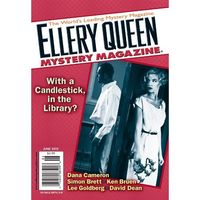 There's an excerpt from my upcoming MONK novel, MR. MONK IS A MESS, in this month's issue of Ellery Queen Mystery Magazine. And you can read an excerpt of the excerpt, entitled MR. MONK AND THE TALKING CAR, right here.
There's an excerpt from my upcoming MONK novel, MR. MONK IS A MESS, in this month's issue of Ellery Queen Mystery Magazine. And you can read an excerpt of the excerpt, entitled MR. MONK AND THE TALKING CAR, right here.
Bumsicle Update
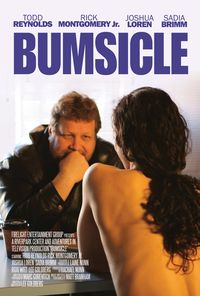 Here's the latest poster from designer Brian Bolin for BUMSICLE, the short film I shot a few weeks back in Kentucky. And here's a link to the terrific end title song, "The Best You've Got," written and performed by Matt Branham. The song, heard out of context, may give you the false impression that this movie is a comedy, and that Detective Flanek is more Clouseau than Columbo, but that is not the case.
Here's the latest poster from designer Brian Bolin for BUMSICLE, the short film I shot a few weeks back in Kentucky. And here's a link to the terrific end title song, "The Best You've Got," written and performed by Matt Branham. The song, heard out of context, may give you the false impression that this movie is a comedy, and that Detective Flanek is more Clouseau than Columbo, but that is not the case.
We're now deep into the sound mix and color correction. I hope to have a finished film by the end of the month…well in advance of our screening at the International Mystery Writers Festival June 14-17 in Owensboro.
Talking Shop
![IMG_1121[1] IMG_1121[1]](https://leegoldberg.com/wp-content/uploads/2012/04/6a00d8341c669c53ef0167648f0033970b-200wi.jpg) For me, Left Coast Crime in Sacramento this past weekend was more of a craft and business conference, very friendly, low-key, and collegial (but very well attended, btw. It was packed). I only went to one panel besides the three that I was on — I spent most of my time in the lobby, bar, and area restaurants talking shop with other authors.
For me, Left Coast Crime in Sacramento this past weekend was more of a craft and business conference, very friendly, low-key, and collegial (but very well attended, btw. It was packed). I only went to one panel besides the three that I was on — I spent most of my time in the lobby, bar, and area restaurants talking shop with other authors.
We talked about craft — how we do what we do — and I was surprised by how many of my colleagues aren't outlining any more (but not surprised by how often they end up having to abandon books mid-way through or do page-one rewrites once they are done with their first drafts). It was also interesting learning the different ways they approach story, character, and revealing clues.
We talked about how publishing contracts are changing, how difficult publishers are making it now for authors to get their "out of print" books back, and how the book tour, even on a small scale, is becoming a thing of the past.
And, of course, there were lots of discussions long into the night about the massive changes in the publishing industry,the rise of ebooks, and the influence of Amazon & the Kindle on every aspect of the business. Many authors were very curious about my self-pubishing experience (in light of this USA Today article), how the monthly DEAD MAN series on Amazon works, and what it was being published by Amazon's Thomas & Mercer imprint with KING CITY. There was lots of discussion about the pros and cons of self-publishing, about the merits and drawbacks of exclusivity with KDP Select (Amazon), and the potential and pitfalls of a new exclusivity deal quietly being pitched to some authors by Barnes & Noble. Some of the folks I chatted with included Denise Hamilton, Thomas Perry, Boyd Morrison, John Rector, Cara Black, Robert Ward, Gar Anthony Haywood, Parnell Hall, D.P. Lyle, Craig Faustus Buck, Jan Burke, William Kent Krueger, Christine Goff, Dick Lochte, Robin Burcell, Janet Dawson, Twist Phelan, Johnny Shaw, Andrew Petersen, Naomi Hirahara, Bill Fitzhugh, and Bruce De Silva, to name just a few.
The upshot of it all, at least from where I was sitting, is that authors see the ebook revolution as scary, exciting, and confusing…but ultimately empowering them in a way they have never been before. The authors I talked to, new and established alike, are radically rethinking many of their long-held beliefs about publishing, what it means to be published, and how they are measuring their own success. It's no longer a foregone conclusion that landing a book contract, even with a big 6 publisher, is necessarily the best move for many authors, particularly those in the mid-list, even if they are still enjoying success in print. Authors who never gave much thought before to the business side of publishing are now thinking about it a lot…and taking a longer view of rights, opportunities they may be signing away for an advance. ![IMG_1130[1] IMG_1130[1]](https://leegoldberg.com/wp-content/uploads/2012/04/6a00d8341c669c53ef0167648f017d970b-200wi.jpg)
It was surprising to me to hear some of the disinformation that publishers are spreading. One author told me that she'd heard from her editor that Barry Eisler's Amazon experience turned out out be a huge disaster, that he regretted not taking St. Martin's $500,000 two-book deal, and that authors who'd once "sipped the Amazon Kool-Aid" were rushing back to legacy publishers in droves. That, of course, couldn't be further from the truth but does illustrate just how terrified and desperate some editors in New York are now that they're realizing that they aren't the only game in town anymore…and that authors are becoming far more business savvy and many are flourishing without them. Publishers don't like seeing books that they rejected, or authors they dropped, or books they once published but fell out of print, now charging up the ebook bestseller lists.
I also met many newly published authors and it was fascinating to hear their take on the business. And, of course, and I chatted with many readers, and I enjoyed getting to know them.
The most surprising thingof all is that I only bought six books… all vintage Harry Whittington paperbacks, snagged at $3-apiece.
All in all, it was a terrific conference.
(pictured Craig Faustus Buck, Thomas Perry, DP Lyle)




